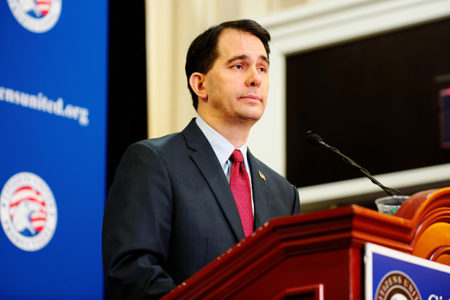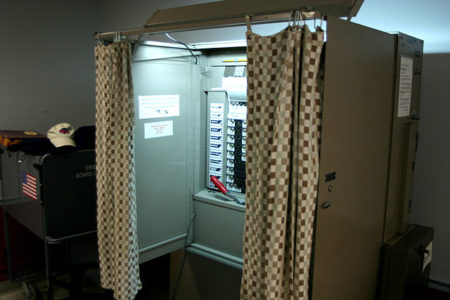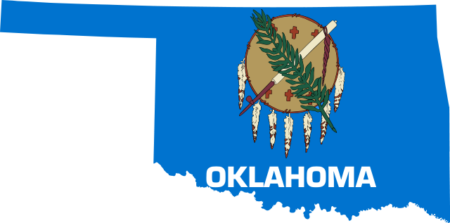By Peter Ward September 16, 2016
Corporate Cash in Politics Documents Unveiled

Governor Scott Walker. ©Michael Vadon, Wikimedia Commons
Corporate influence on politics is again in the news this week, after an investigation by The Guardian revealed court documents that display the lengths to which politicians, lobbyists and judges go to solicit money.
The documents consist of 1,500 pages of material gathered by prosecutors investigating alleged wrongdoing in political fundraising. Last year, the Wisconsin supreme court ruled that the documents should be destroyed, but The Guardian was able to obtain a surviving set.
The documents come from a case known as the “John Doe Investigation,” which looked into suspected criminal campaign finance violations by the campaign committee of Wisconsin governor Scott Walker. The investigation is currently the subject of a petition in front of the U.S. supreme court. In July 2015, Wisconsin’s state supreme court stopped the investigation, saying the prosecutors had misunderstood campaign finance law and picked on people and groups that were “wholly innocent of any wrongdoing.”
The files reveal a direct link between governor Scott Walker’s campaign and one of the judges on the Wisconsin supreme court, David Prosser. According to the documents, allies of Scott Walker channeled $3.5 million in corporate funds to pay for TV and radio ads that backed the judge’s re-election.
Despite the fact that the investigation centered on the people responsible for helping him get re-elected, Justice Prosser refused to recuse himself from the case.
The documents also show that the owner of NL Industries, a company that has produced lead paint, donated $750,000 to a third party group closely aligned to governor Scott Walker. Around the time these donations were made, Walker passed new laws making it more difficult for victims of lead paint poisoning to sue lead paint manufacturers. Federal courts later overturned the laws.
Income and Voting Correlation Explored

Polling booth, University at Buffalo. ©Public domain, Wikimedia Commons
How does a person’s income affect the likelihood that they will vote in an election? That’s just one of the questions posed by the New York Times in an interactive graphic published on Tuesday.
It is often presumed that young people, low income people and Hispanics do not vote, but the data presented in the article from the 2012 presidential election shows that the majority of people who didn’t vote were white, middle-income and middle-aged.
There were more non-voters among people earning $20k to $100k in the 2012 election than there were among those earning less than $20k, according to the graphics. But the data did also show that the older, richer and more educated a person is, the more likely they are to vote.
“Most of the differences between people who vote and those who don’t vote can be accounted for by motivational reasons — levels of political interest and engagement,” Benjamin Highton, a professor of political science at the University of California, Davis told The New York Times. “And levels of political interest and engagement are strongly correlated with education and income.”
Oklahoma Rules Workers’ Comp Law Unconstitutional

Oklahoma flag/map. ©Darwinek, Wikimedia Commons
A nationwide campaign to let companies opt out of state worker compensation plans was dealt a blow on Tuesday when the Oklahoma Supreme Court ruled that such plans are unconstitutional. The justices ruled 7-2 that the opt-out plans were unconstitutional because they allowed companies to treat their own injured workers differently from all others in the state.
Following the ruling in Oklahoma’s supreme court, Texas is now the only state that allows employers to opt out of workers’ comp insurance. Such opt-outs have been available to companies in Texas since workers’ comp rules were first adopted there in 1913.
Legislation passed in Oklahoma in 2013 gave employers in the state the opportunity to opt out of state-mandated workers’ compensation plans and to write their own, according to an article published on Tuesday by ProPublica. Encouraged by the legislation’s success in Oklahoma, a coalition of retail companies led by Walmart attempted to get similar laws passed across the country. Opt-out laws were proposed in South Carolina, Tennessee, Georgia, Mississippi, West Virginia, Wisconsin and Illinois.
But a joint investigation a year ago by NPR and ProPublica found that opt-out plans at 120 companies in Texas and Oklahoma resulted in lower benefits and more restrictions than state workers comp. Workers’ comp is designed to provide lost wages and medical care for workers who are hurt at work and to protect businesses from lawsuits. But under the opt-out legislation in Texas and Oklahoma, companies were able to alter the programs to save money. For example, in Texas, Sears workers are only entitled to compensation if they report an injury before a shift ends, and that law also lets Costco pay workers $15,000 compensation for a lost finger, when rival Walmart pays $25,000.
The decision is the latest in series of state Supreme Court rulings that have struck down proposed and passed business-driven changes to workers’ comp laws that were featured in the ProPublica and NPR investigation. For example, Florida recently threw out a law which capped attorney fees in compensation cases, and limited workers to two years temporary disability pay.
Bayer Confirms $66bn Monsanto Deal

Genetically modified plums. ©
By Scott Bauer, USDA ARS, Wikimedia Commons
German chemicals company Bayer confirmed a record-breaking $66 billion merger with genetically modified seeds business Monsanto this week, creating the world’s largest seeds and pesticides company.
The offer is a record cash takeover, and values Monsanto at $128 a share. Bayer’s most profitable business is pharmaceuticals, such as Alka-Seltzer, but it also sells pesticides. The deal is expected to shift the company’s focus away from pharmaceuticals towards seeds and pesticides.
Some say that the deal could starve Bayer’s pharma business of the resources needed for it to grow. “It obviously becomes a different company now,” Andrea Williams, head of European equities at Royal London Asset Management Co., told Bloomberg. Royal London Asset Management manages 1.3 billion pounds ($1.7 billion) in European stocks, including Bayer shares. “The danger is the pipeline is somewhat empty, so they probably need to do some deals.”
Monsanto’s genetically modified crops have been used widely in the U.S., but the plans to introduce them into Europe have been met with opposition from environmental activists. Werner Baumann, chief executive of Bayer, said the takeover would bring benefits across the board and deliver “substantial value to shareholders, our customers, employees and society at large”.
This Week’s Top Headlines
Factory Output in U.S. Declines More Than Forecast in August – Sho Chandra, Bloomberg News
Harvard study: Political ‘dysfunction’ crippling U.S. economy – Politico
Tesla Says an Oil Executive Tried to Impersonate Elon Musk With a Lame Yahoo Email Address – Sophie Kleeman, Gizmodo
Trump’s new reason not to release tax returns – Eugene Scott, CNN
Ford to move all small-car production to Mexico as profits set to fall – Sam Thielman, The Guardian
Hermès and Richemont warn over luxury sector’s outlook – Adam Thomson, Ralph Atkins, The Financial Times
UK interest rates left unchanged at 0.25% – BBC
Federal prosecutors launch probe into Wells Fargo’s sales tactics – Renae Merle, Ellen Nakashima, The Washington Post
U.S. opens investigation into Wells Fargo fake accounts scandal – Matt Egan, Shimon Prokupecz, Cristina Alesci, CNN Money
Exploding Galaxy Note 7 Delays Are Damaging Samsung – Ewan Spence, Forbes
This entry was posted on Friday, September 16th, 2016 at 8:28 pm. It is filed under Week in Review. You can follow any responses to this entry through the RSS 2.0 feed.
Comments are closed.
